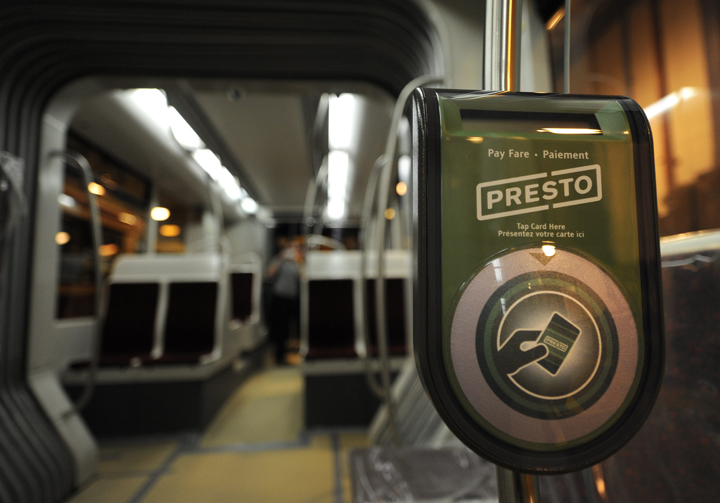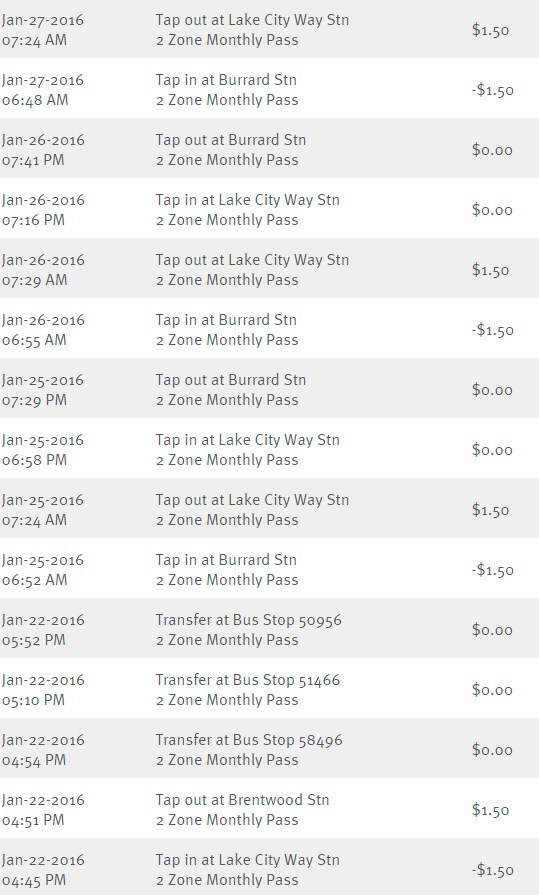Some transit passes being rolled out in British Columbia and Ontario could be used by abusers to control, stalk or harass women, say women’s and privacy advocates.

The issue has to do with the Lower Mainland’s “Compass Card” and Ontario’s “PRESTO” card system, which track pass-holders’ transit use.
The two systems work in a similar way: the rider taps their pass when they enter a bus or train, and in some cases, taps out when they exit or transfer. That data is maintained by the transit agency to calculate fares, and registered users can access their transit history online.
It’s extensive. A Global News reporter in Ottawa was able to read her entire transit use for the past three months: the precise time she got on a bus and where, down to the street corner.
A Global reporter in Vancouver reported similar information on his travels – in his case, the data showed when he got on and off the Skytrain and at what stations.
This amount of data is “very concerning,” said Angela Marie MacDougall, executive director of Battered Women’s Support Services in Vancouver, though she is not aware of any incidents yet where it was used by an abusive partner.
Any time an abusive partner can have access to information on where a woman is going and what she’s doing, “It increases women’s risk for increased violence, for violence and abuse.”
“We’ve given another tool to abusers.”
Users have to register their cards to view their transit history online, though in BC, Compass users can also tap their cards on a payment machine to see their last eight trips, without registering.
READ MORE: BC Civil Liberties Association raises privacy concerns over Compass Card travel history tracking
But making a username and password might not be enough to keep your information private, said Vincent Gogolek, executive director of the BC Freedom of Information and Privacy Association. “This can be an issue for people fleeing violence or people that have controlling spouses or live-ins. ‘I want to know where you were. Let me check your card. Give me the password.’’
MacDougall said some women might not be able to choose whether or not to register. “Abusive partners maintain power and control. So a woman in an abusive relationship may not have the option about registering the card.”
“This Compass Card, with the online access, creates a whole other way, and quite frankly a very dangerous way, for an abusive partner to maintain power and control in a relationship.”
Women are especially in danger when they leave an abusive relationship, she said. For that reason, many shelters don’t publish their addresses in order to give women some confidentiality and safety.
“Any woman that’s left right now, and she’s not aware that her partner has the login information and knows where she is at 7 o’clock Monday through Friday, that would be a serious safety concern.”
Gogolek thinks that anyone who is concerned about privacy should buy their transit pass with cash, at a station or kiosk. “Because then all they know is it’s card XB79. They don’t know it’s your card or my card. It’s there and there’s this much money on it.”
There are a limited number of places to pay in cash, in all cities, though. And many customers don’t mind the convenience: Roughly 1 million of PRESTO’s 1.85 million cardholders have registered.
Registering also brings certain benefits, like being able to automatically reload your card or get money back if it’s lost or stolen.
Changing cards
Customer safety is the top priority for Metrolinx, the agency that runs the PRESTO system, said Anne Marie Aikins, senior manager of media relations at Metrolinx, and a former executive director and spokesperson for rape crisis centres.
“For PRESTO, the reason that it does track your whereabouts is so you can see whether you were charged too much, whether you got the discount that you were wanting, that sort of thing.”
Like any card with a password that has money attached to it, she said, it’s important to safeguard your password. If a woman is concerned that someone might be accessing her transit history, she should change her password frequently or even cancel her card and get a new one.
And if a spouse was pressuring a woman to register, she said, “If somebody had a woman under that much control, then there are probably other things that they are doing. Credit cards, banking information.”
“I know men, abusive spouses, will use ways to monitor you. Whether it’s a PRESTO card, a credit card, your banking information, your phone calls, they often will track them.”
If someone was asking to track your whereabouts, that would be a big clue that you’re in an abusive relationship, she said.
“Then you have to use whatever’s the right time for you to get out of a relationship.”
In an emailed statement, TransLink, the agency running the Compass Card program, told Global News, “Some customers would prefer not to register their Compass Cards, as it involves the provision of personal information. For these customers, we recommend paying cash, debit or credit when using transit.”
MacDougall said her organization is very concerned about the potential for abuse, and will be bringing their concerns to TransLink.
“Women need to know and all of the transit authorities that are using this system need to know, and the program needs to change,” she said.
Correction: An earlier version of this article stated that BWSS runs shelters, which they do not.




Comments